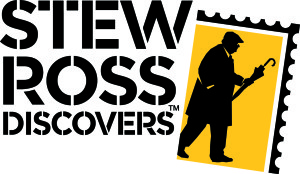This week we celebrate the successful Allied invasion of Europe on the Normandy beaches of northern France. On 6 June (Thursday), it will be the 80th anniversary of D-Day and the beginning of the Allied push into Germany.
I will be giving a one-hour on-line presentation this Thursday for Bonjour Paris (see below). I decided to reprint our 2018 blog on Operation Double Cross that happens to be my presentation topic. Our discussion will expand the story of Operation Double Cross. I hope you can join us on Thursday.
Join Stew Ross for a Discussion on
France Today
“REMEMBERING D-DAY:
Operation Double Cross”
Thursday, 6 June 2024
11:30 – 12:30 (EST)
Click here to watch the trailer for the presentation.

Register Now: Click here.
BONJOUR PARIS is a digital publication dedicated to all things Paris. Visit the web-site here.
Undoubtedly, many of you have heard the story of the fake army which was used to deceive Hitler and his generals into planning for a cross channel invasion (across the Strait of Dover to Pas de Calais). It is true but the story is somewhat more complex and as wartime documents seven decades old are declassified, historians are only now able to fill in missing gaps and answer why Hitler reacted the way he did to the Normandy invasion.
Did You Know?
Did you know that 1st Lt. Paul Chaufty was a P-47 Thunderbolt pilot who was flying an armed reconnaissance mission on 13 August 1944 when he was shot down over the French villages of Ciral and Saint-Ellier-les-Bois? It was the day Allied armies were liberating Ciral. Lt. Chaufty bailed out of the plane, but his parachute never opened, and he fell to his death in a field. A mile away, the plane crashed.
Marie Bastien was fourteen at the time and watched the young pilot’s plane come down. The following day, her father found the body and brought Chaufty’s remains back to the farm where he was buried wrapped in his parachute. Four days later, the pilot’s remains were removed and buried in a temporary military cemetery before final relocation to the Fairview Cemetery in Carthage, New York.
Marie never forgot her experience watching Lt. Chaufty fall to his death. She vowed to keep his memory alive and over the years, discussed this with her daughter who eventually reached out to Lt. Chaufty’s family. One week ago, Marie, her daughter, and members of the Chaufty family stood in the village of Saint-Ellier-les-Bois as a plaque honoring Paul Chaufty was unveiled.
Thanks to one woman’s tenacity, a brave American’s legacy will not be forgotten.

Deception strategies were used by the Allies and Germans against one another throughout World War II. However, by 1942, the Americans and British held the upper hand: intelligence was gained through the top secret Ultra program by decrypting German messages using the Nazi military Enigma machine at Bletchley Park. Deception methods created primarily by British intelligence were becoming increasingly complex and successful. As Churchill, Roosevelt, and Stalin agreed in late 1943 on plans for an invasion of Europe, the Allies came up with the largest deception plan to date to be used against the Nazis.


Operation Bodyguard and Fortitude
Operation Bodyguard was the American and British-led umbrella deception plan to mislead the Germans into thinking the inevitable invasion of Europe would take place at a location other than the real invasion site. Additionally, the plan was to deceive Hitler about the actual date, time, and size of the assault force. It was formulated in 1943 once the Allies agreed to a 1944 invasion date.
There were many directives under Operation Bodyguard including Operation Cockade, Plan Jael, Operation Quicksilver, and the Torrent Plan. However, the largest and most successful was Operation Fortitude.

Fortitude was the deception plan aimed at tricking Hitler and his generals into believing the invasion would take place at either the Pas de Calais in France (Fortitude South) or in Norway (Fortitude North). Two separate phantom armies were established in Edinburgh, Scotland and the south of England, aimed at Norway and Pas de Calais, respectively. In addition to deceiving the Nazis about the site, Fortitude had a secondary goal: ensure the Germans believed the Normandy landings were merely a diversionary force with the real invasion still to come at either Calais or Norway. Their goal was to eliminate a Nazi counter-attack by making sure Hitler did not send reinforcements to Normandy for a minimum of 48-hours and preferably, up to 14-days.


The overall Fortitude plan was devised by Colonel David Strangeways (1912−1998), head of General Montgomery’s deception staff. A year earlier, Strangeways had successfully orchestrated the deception plan for the Allied invasion of North Africa. His plan invented a new field army, the First United States Army Group (FUSAG). This fake army was to be passed off as the main Allied forces being readied for the invasion at Calais.


Deception methods included physical deception (dummy tanks, aircraft, buildings, personnel, and landing craft), fake wireless transmissions, controlled leaks through diplomatic channels, and the support of high profile individuals such as General Patton and yes, even imposters. However, the one deception tactic that proved the most successful was the use of double agents.


Compromised German Spies
By the time Operation Bodyguard was put into action, all of the German spies in Britain had either surrendered to B1A, the British counter-intelligence division of MI5 or were captured (one committed suicide). Many of them became British double agents after being interrogated at Latchmere House. Working from London or Lisbon, these men and women quickly reported back to their respective Nazi handlers. The double agents formed the nucleus of the Double Cross System or XX System and their mission was to convince their Nazi handlers that the Allied invasion force consisted of two army groups: 21st Army Group under Montgomery (the real invasion force) and FUSAG commanded by Patton (the fake army). Their disinformation would eventually lead Hitler to believe the actual invasion would take place at Calais with all other potential landing sites as diversionary targets. One of the primary goals was to convince the Nazis that even if Montgomery’s army attacked elsewhere, the real invasion was yet to come at Calais or Norway. It was hoped that Hitler would delay moving the bulk of his troops and armored divisions south for at least 48-hours once he realized Montgomery’s invasion was the real one.

Double Cross System Agents
Three of the most famous and effective double agents were Juan Pujol García, Roman Czerniawski, and Duško Popov. These agents and the information they handed over to the Germans were so convincing that their handlers recommended them for Nazi medals.
Juan Pujol García (1912−1988), code named Garbo, was one of the most ingenious double agents employed by MI5. García had developed a hatred of the Communist and Fascist regimes in Europe and offered his services to both the Americans and the British. After being declined, García turned to the Nazis who accepted him as one of their agents. He moved to Lisbon where he established a very large network of additional agents reporting to him. The Nazis were very impressed by the size of his intelligence organization and the information García and his agents were funneling to them. What the Germans didn’t know was that García’s sub-agents were all fictional—he made them all up including the information he fed his handler. The Allies were impressed when the Germans tried to follow-up on one of García’s fictional pieces of information and soon, García was working out of London as the double agent assigned the codename of Garbo. By that time, the Germans were generously funding Garbo and his imaginary network of twenty-seven agents (I suppose you might call it a Double Cross Ponzi Scheme). The Nazis specifically assigned García the responsibility for keeping them informed on Allied invasion plans. It was primarily because of Garbo’s disinformation that Hitler stuck to the premise that Calais was the primary invasion target. For his work, Hitler awarded Garbo with the Iron Cross-Second Class (not to be outdone, the British awarded him the Order of the British Empire).

Roman Czerniawski (1910−1985), codenamed Brutus, was a former SOE agent in France. Czerniawski founded the first organized French resistance network called Interallie which became the only source of information inside France that the Allies could rely on during the first year of the Nazi occupation. The network was destroyed in November 1941 with its agents either captured or executed. Czerniawski was arrested and offered to work for the Nazis (read my previous blog, La Chatte here). He convinced the Germans to send him to London to spy on the British. Upon arriving in England, Czerniawski immediately turned himself into MI6 and offered his services as a double agent. He was soon working for MI5 as part of the Double Cross System. The British eventually entrusted him with important information to pass onto the Germans and his contributions were enormous to the overall deception plan.

Duško Popov (1912−1981), a wealthy Serbian playboy, was given the codename “Tricycle” after two sub agents were added to his Double Cross network. We previously discussed his encounter with Ian Fleming at the Lisbon casino. However, in addition to supplying the Nazis with disinformation about the eventual invasion, Popov knew in advance about the attack on Pearl Harbor. In 1941, the Germans sent Popov to the United States with the intent of setting up a spy network. He was given three pages of specific questions that needed to be answered. One page dealt solely with questions about Pearl Harbor and its defenses. Popov approached the FBI and was finally granted an interview with J. Edgar Hoover. Hoover refused to believe Popov or his belief that Pearl Harbor would be the target of an attack based on the questions the Germans were asking. The head of the FBI didn’t trust Popov because he was a double agent and Hoover deplored Popov’s playboy lifestyle. The information Popov provided the Americans never made it past Hoover’s desk. Learn more about the real life of James Bond here.

Aftermath
The Germans were so thoroughly convinced (and happy) that the Double Cross agents were reporting accurate information that the Abwehr and Himmler’s SD (the two primary Nazi intelligence organizations) stopped sending their agents into England. The disgraced MI5 agent and turned Soviet spy, Anthony Blunt, supplied the Soviets with information about Double Cross. Stalin thought the information about Double Cross was too good to be true and he rejected it—he became convinced the Americans and British were using similar tactics against him.
While the agent-supplied information was false, Stalin was right—the deception organization was too good to be true. The immense network of British double agents, the disinformation they created, and most importantly, the gullibility of the Nazis was astounding. Because of Operation Fortitude and in particular, the work of the double agents, Hitler kept the majority of his forces concentrated north in the Calais area and did not move them south until it became certain that the Normandy invasion was not a diversionary invasion but the real one. It is likely that the Double Cross System saved the lives of thousands of Allied soldiers and increased the probability for a successful invasion.
Fearful of reprisals from former Nazis, García faked his own death in 1949 and went underground. A British politician tracked him down in 1984 and interviewed García. He convinced the ex-agent to visit England where Prince Philip met with him and García was eventually reunited with many of his former Double Cross System colleagues. Learn more about Juan Pujol García, code name Garbo here.
Settling in London after the war, Czerniawski was awarded the Officer of the Most Excellent Order of the British Empire for his role in deceiving the Nazis. He became a commercial printer and married twice more after divorcing his first wife. In retirement, the former double agent enjoyed spending time with his thirty-two cats and watching James Bond movies (he wouldn’t have known Duško Popov since the Double Cross agents never crossed paths and their identities were kept secret from one another).
After the war ended, Popov continued his freewheeling lifestyle. He married, divorced, had four sons, and continuously complained about his friends who pointed out his “immoral life.” Popov was a successful businessman who ran many different types of companies. He never seemed to lack for any money and even by 1948, MI5 was still trying to figure out Popov’s wartime finances during his tenure as a double agent. Popov lived his entire life like a twenty-something. As Ben Macintyre wrote, “His finances remained opaque, his tastes extravagant, and his mysterious glamour undimmed.” Regardless of his lifestyle, the British knew his accomplishments came with much personal risk and for his invaluable contributions to the Allied efforts, Popov was awarded the OBE after he declined a knighthood.
There were more than sixty double agents employed under the Double Cross System. Each of them had two handlers: one British and one German. After the war, the Double Cross System and its related documents remained highly classified. The deception was so thorough that many of the German handlers died without knowing their agents had turned and worked as double agents for the Allies.
Recommended Reading and Viewing
Dear, Ian. Spy and Counterspy: Secret Agents and Double Agents from the Second World War to the Cold War. Chelteham, U.K.: The History Press, 2013.
Follett, Ken. The Eye of the Needle. New York: Penguin Books, 1978.
Garby-Czerniawski, Roman. The Big Network. London: George Ronald, 1961.
Levine, Joshua. Operation Fortitude: The Greatest Hoax of the Second World War. New York: HarperCollins Publishers, 2012.
Macintyre, Ben. Agent Zigzag: A True Story of Nazi Espionage, Love, and Betrayal. New York: Crown Publishing Group, 2007.
Macintyre, Ben. Double Cross: The True Story of the D-Day Spies. New York City: Broadway Books, 2012. Watch an interview with Ben Macintyre here.
Popov, Duško. Spy/Counterspy: The Autobiography of Duško Popov. New York: Grosset & Dunlap, 1974.
Purnell, Sonia. A Woman of No Importance. New York: Viking, 2019.
Sergeyev, Lily. I Worked Alone: Diary of a Double Agent in World War II Europe. Jefferson, NC: McFarland, 2014.
Tremain, David. Double Agent Victoire: Mathilde Carré and the Interallié Network. Gloucestershire: The History Press, 2018.
Vomécourt, Philippe de. An Army of Amateurs. Garden City: Doubleday & Company, Inc., 1961.
Mr. Macintyre’s book deals exclusively with the Double Cross System. He (along with other historians) is the beneficiary of declassified documents and weaves a very interesting story. Although Roman Garby-Czerniawski was one of the principal double agents, his book deals only with his activities as an SOE agent and founder of the first resistance network in France. He was prohibited from discussing his role as double agent because of the “Official Secrets Act,” a British law which prevents government employees from disclosing any information (it never stopped Popov from discussing his exploits). Mr. Vomécourt’s book deals only with resistance efforts in France. However, several of the Double Cross System characters show up in both, The Big Network and An Army of Amateurs.
Several novels were written and loosely based on the Double Cross System. Ken Follett’s 1978 novel Eye of the Needle was made into a film starring Donald Sutherland. Jack Higgins wrote The Eagle Has Flown with the premise that Hitler was convinced the landings were to take place at Calais.
What’s New With Sandy and Stew?
Sandy and I returned from our Baltic cruise several weeks ago. After three weeks in Japan and then another three weeks on the road, my to-do-list was quite lengthy when we returned. I’ve worked my way down the list and will now turn my attention to creating some future blogs. If there is a topic you believe might be of interest to our readers, please don’t hesitate to let me know.
Someone Is Commenting On Our Blogs
I’d like to thank John Winn Miller for reaching out to us once again regarding the recent reprint blog, Jacques the Ripper (click here to read). John’s new book will be published in 2025 and is the second book in the trilogy of Capt. Jake Rogers’ adventures during World War II. Amazingly, Dr. Petiot will be featured in John’s book. Looking forward to reading RESCUE RUN: Capt. Jake Rogers’ Daring Return to Occupied Europe.
Do you remember our blog, The Naked Heroine? (Click here to read the blog.) It is the story of Lydia Lipski and her father and their resistance activities. They were arrested by the Gestapo and fortunate to survive the concentration camps. Lydia passed away under mysterious circumstances, likely as a result of her internment at KZ Ravensbrück. Her son, Patrick, reached out to us recently. I hope he and I can establish a dialogue and perhaps he will allow us to expand upon his brave mother’s story.
A big thank you to Marco Popov for contacting us regarding his father, Duško Popov, and our blog, The Double Cross System. Marco informed us that his father’s code name “Tricycle” was actually based on the fact that two sub-agents were added to his Double Cross network. The misconception of the “Tricycle” origination reportedly started with J. Edgar Hoover’s comment, “Look at his codename. It probably means he likes to bed two girls at the same time.” Duško’s first codename “Skoot” was changed to “Tricycle” after his network grew to three agents. We have updated the original 2018 blog as well as this reprint. Oh, and another tidbit about Duško. He was awarded the British OBE after declining a knighthood. Unfortunately, some of these facts never made it into Macintyre’s book despite his interview with Marco. Again, thank you Marco for reaching out to us.
If there is a topic you’d like to see a blog written about, please don’t hesitate to contact me. I love hearing from you so keep those comments coming.
Share This:
Follow Stew:
Find Stew’s books on Amazon and Apple Books.
Please contact Stew directly for purchase of books, Kindle available on Amazon. Stew.ross@Yooperpublications.com or Contact Stew on the Home Page.
Please note that we do not and will not take compensation from individuals or companies mentioned or promoted in the blogs.
Walks Through History
Copyright © 2024 Stew Ross







I always enjoy a good mystery. Fascinating real-life characters. .
Hi Greg, glad you enjoyed the blog. Hope you caught my presentation on 6 June through “France Today.” STEW